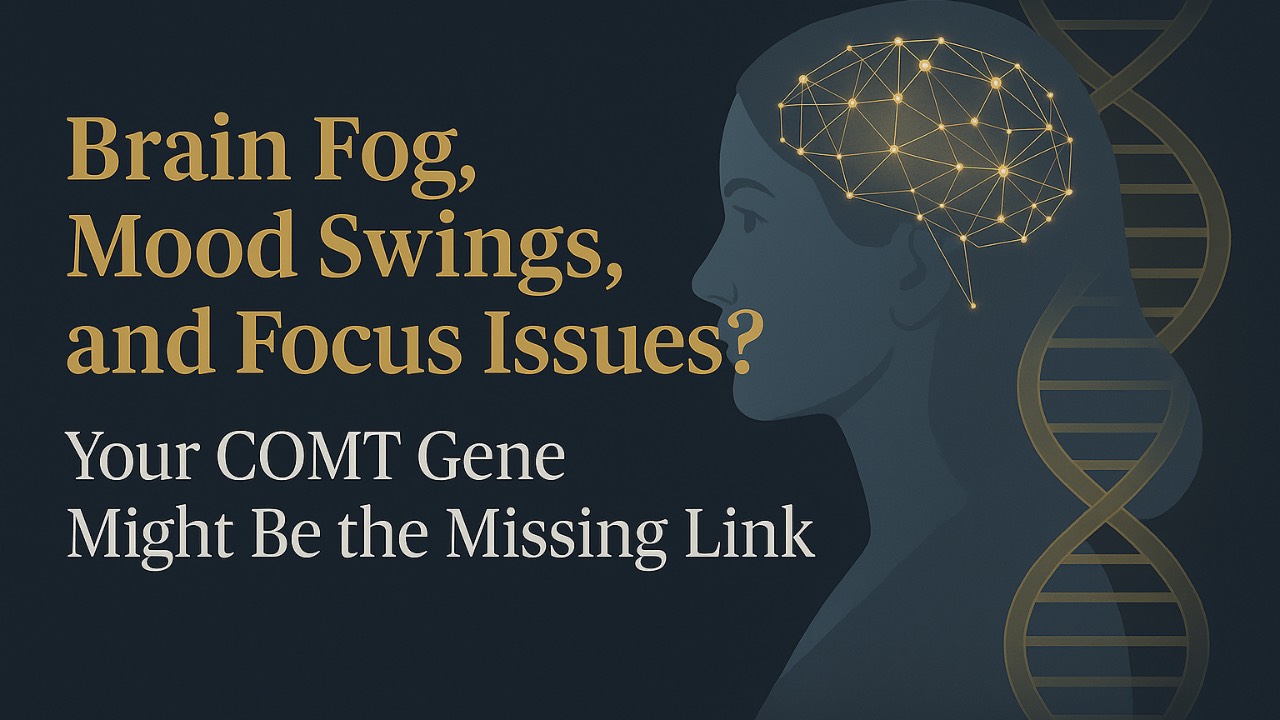Brain Fog, Mood Swings, and Focus Issues? Your COMT Gene Might Be the Missing Link
May 01, 2025
You might wake up feeling clear, energized... even motivated.
But then by midday, the fog rolls in. You lose your train of thought. Your focus slips. Or maybe it’s not brain fog, maybe it’s tension. Overthinking. Irritability you can’t explain. Sometimes it feels like your brain is too loud. Other times, like it’s underwater.
If this sounds familiar, you’re not alone.
And it’s probably not “just stress” or “just hormones.”
There’s a good chance your COMT gene could be playing a role.
What Is the COMT Gene, and Why Is It Important?
COMT (catechol-O-methyltransferase) is the enzyme your body uses to break down stimulating neurotransmitters like dopamine, norepinephrine, and adrenaline. Think of COMT as your brain’s chemical cleanup crew.
When it works efficiently, you feel alert yet calm.
Motivated, but steady.
But when your COMT function is slow, those chemicals linger longer than they should, leading to:
- Racing thoughts
- Anxiety after caffeine or supplements
- Emotional hypersensitivity
- Focus that crashes without warning
Common genetic variants like V158M and H62H can slow this process. The symptoms may be subtle—until life gets stressful or your nervous system gets overloaded.
Why It’s Not Just COMT: Other Genes That Impact Mental Clarity
Your focus, mood, and emotional balance aren’t influenced by COMT alone. Several other methylation and neurotransmitter-related genes also play vital roles:
MTHFR A1298C: The Silent Mood Disruptor
While most people know about MTHFR C677T, the A1298C variant has a unique role. It supports the production of BH4, a compound critical for serotonin, dopamine, and nitric oxide production. It also helps clear ammonia and maintain neurotransmitter balance.
When combined with COMT or MAO-A variants, you may experience:
- Brain fog
- Emotional ups and downs
- Poor tolerance to B vitamins
- Sensitivity to stress, noise, or social energy
Pro tip: Taking methylfolate isn’t always the answer. Sorry internet, you're wrong. It's more complex than this. For some, it increases anxiety or overstimulation. A gentler, more nuanced approach works better in most scenarios.
MAO-A: Your Emotional Thermostat
MAO-A (monoamine oxidase A) breaks down serotonin and norepinephrine. When it’s slow, you may feel emotions more intensely and find it hard to “come down” after stress.
Signs of sluggish MAO-A:
- Anxiety with no clear trigger
- Irritability after emotional conflict
- Sensitivity to tone, sound, or pressure
When COMT and MAO-A are both slow, emotional reactivity can feel overwhelming.
DAO & HNMT: Histamine and Mood Are Connected
Histamine isn’t just about allergies—it’s a neurotransmitter too. It’s stimulating by nature. And if your body struggles to clear it (due to slow DAO in the gut or HNMT in the brain), it can make your nervous system feel over-amped.
Look for signs like:
- Feeling wired after wine, cheese, or leftovers
- Anxiety or flushing after certain foods
- Poor tolerance to heat, crowds, or noise
COMT also helps clear histamine, so multiple sluggish pathways can create a bottleneck. Think of it like a red light that never turns green, the traffic just backlogs, compounding the overstimulation.
GAD1: The GABA-Glutamate Balance Keeper
GAD1 is essential for converting glutamate (excitatory) into GABA (calming). A sluggish GAD1 gene can leave you in overdrive—even when you’re trying to relax.
Signs you may need GAD1 support:
- Feeling on edge or easily startled
- Trouble winding down before bed
- Overreaction to minor stress
- Shallow or restless sleep
Support can be simple: magnesium, glycine, taurine, and lifestyle strategies like breathwork.
Fast COMT vs. Slow COMT: Which Are You?
Slow COMT Types Often Experience:
- Anxiety after caffeine or methylated B vitamins
- Deep emotional sensitivity
- Overstimulation in busy environments
- Delayed emotional processing
Fast COMT Types May Experience:
- Low motivation or “flat” mood
- Poor focus without stimulation
- A need for intense input just to feel alert
- Underproduction of dopamine or adrenaline
Most people fall somewhere between these extremes—and your environment can turn those genes “up” or “down.”
A Game Plan to Support COMT and Related Genes
1. Calm the Nervous System First
Start slow and gentle:
- Magnesium glycinate or threonate
- Phosphatidylserine
- L-theanine or taurine
- Grounding practices like breathwork, bodywork, or vagus nerve support
2. Use Food and Timing Strategically
- Avoid tyrosine-heavy meals late in the day
- Stick to grounding, warm meals in the evening
- Track reactions to histamine-rich foods (wine, spinach, leftovers)
3. Support Histamine and Glutamate Clearance
- Use vitamin C to support DAO
- Reduce foods like fermented items, bone broth, or spinach during flares
- Add glycine, taurine, or magnesium to promote GABA
4. Introduce Supplements One at a Time
- Start low and go slow—especially for slow COMT or MAO-A types
- Monitor how you feel
- Adjust based on nervous system cues
Final Thought: You’re Not Too Much... You’re Overflowing
If you’ve ever felt like you’re “too sensitive” or “too much,” here’s a reframing:
There is nothing wrong with you, I promise, it's your biology and we just need to know how to work with your body, rather than against it.
You’re processing more. More dopamine, more stimulation, more emotion. And these are amazing qualities that you can harness to your advantage, but you need to know they exist to learn how to control them.
When you understand your genetic wiring, you stop fighting your biology and start working with it.
And that’s where healing begins... with clarity, compassion, and a plan that finally fits.
If this post resonated... if the fog, the scattered focus, or the sudden emotional shifts felt a little too familiar, you’re not alone. And you don’t have to figure it out on your own.
I created the Nervous System Reset Protocol to help you gently support the pathways that influence mood, clarity, and calm—especially if your genes, like COMT, tend to hold on a little too tightly.
Get your free copy of the Nervous System Reset Protocol, here and take the next step toward feeling more like yourself again.
Haven’t Completed A Genetic Test Yet?
If you’re reading this and thinking, “I haven’t done any of this yet, but I’m curious,” you are not behind.
If you’re looking for a genetic panel that covers all five systems above, methylation, histamine, detox, neurotransmitters, and hormone clearance — this is the panel I trust and use in practice.
It is called The Works Panel by MaxGen Labs and it’s the same test I’ve used with hundreds of patients over the years to guide real, personalized care.
You can start there. And come back here when you are ready to make sense of what you find.


